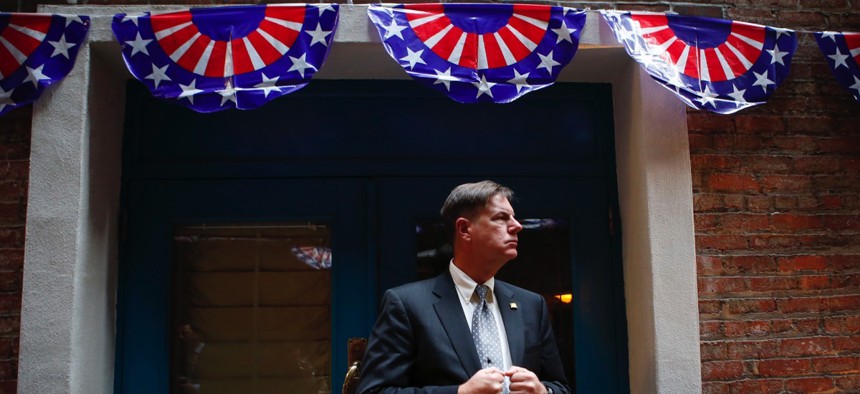'Consistently Disorganized, Chaotic and Inefficient'

A U.S. Secret Service agent guards a room, where former President Bill Clinton and his wife, Democratic presidential candidate Hillary Clinton, were in New York City a day before the state’s primary. Kathy Willens / AP Photo

Connecting state and local government leaders
More than 60,000 Brooklyn Democrats’ names were removed from voting lists by the city Board of Elections, prompting state and local officials to push for reforms ahead of Election Day 2016.
New York state and local officials lined up to criticize Tuesday’s primary and call for New York City Board of Elections voting reforms.
City Comptroller Scott Stringer announced an audit of the “consistently disorganized, chaotic and inefficient” BOE, citing more than 125,000 disenfranchised Brooklyn voters—a move supported by Mayor Bill de Blasio.
The root problem was entire buildings and blocks being purged from the BOE’s voter rolls, which de Blasio demanded be reversed and state Attorney General Eric Schneiderman vowed to investigate:
I am deeply troubled by the volume and consistency of voting irregularities, both in public reports and direct complaints to my office's voter hotline, which received more than one thousand complaints in the course of the day yesterday. That's why today, we have opened an investigation into alleged improprieties in yesterday's voting by the New York City Board of Elections. If necessary, we will initiate inquiries in additional areas of the State where voting irregularities appeared unusually high.
List issues affected as many as 63,821 voters registered Democrat, according to the BOE, which has yet to fully explain why locations opened late, missing poll books and ballot machine malfunctions.
Other borough residents reported being told to vote at the wrong polling location or having trouble accessing their site—issues de Blasio said necessitated major changes to state voting law.
While it’s too soon to say what those reforms might look like, city Council Member Ben Kallos renewed his request for a voter information portal.
“Voters shouldn’t have to continually check their status before casting a ballot,” Kallos said in a statement. “But unless Albany finally updates its archaic and disenfranchising election laws, the onus is on voters to verify their eligibility before each election.”
The portal Kallos proposed in city legislation heard by the Governmental Operation Committee in 2015 would allow voter to check their registration status, update information, request and track absentee ballots, and verify their voting histories.
Kallos also criticized the BOE for awarding positions based on patronage rather than merit and suggested the city stop funding unqualified candidates.
An online state Board of Elections tool does allow voters to verify their registration, which can be nullified if they haven’t voted in two successive federal elections and fail to reply to a BOE letter.
Dave Nyczepir is a News Editor at Government Executive’s Route Fifty.

NEXT STORY: Indictments in Flint Water Investigation; Uber, Lyft Score California Victory





